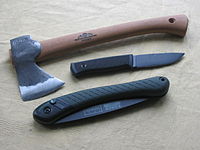Bushcraft: Difference between revisions
No edit summary |
|||
| Line 1: | Line 1: | ||
What is a Bushcraft. Let me tell you. It is a bush with a craft in it:) |
|||
{{original research|date=October 2011}} |
{{original research|date=October 2011}} |
||
{{wikt}} |
{{wikt}} |
||
Revision as of 17:21, 2 March 2012
What is a Bushcraft. Let me tell you. It is a bush with a craft in it:)
This article possibly contains original research. (October 2011) |

Bushcraft is a long-term extension of survival skills. A popular term for wilderness skills in Canada, The UK, Australia, New Zealand and South Africa, the term was popularised in the southern hemisphere by Les Hiddins (The Bush Tucker Man) in Australia as well as in the northern hemisphere by Mors Kochanski and recently gained considerable currency in the United Kingdom due to the popularity of Ray Mears and his bushcraft and survival television programmes. Bushcraft is about surviving and thriving in the natural environment, and the acquisition of ancient skills and knowledge to do so. Bushcraft skills include; firecraft, tracking, hunting, fishing, shelter building, the use of tools such as knives and axes, foraging, hand-carving wood, container construction from natural materials, rope and twine-making, and many others. These are the kinds of skills well known to our ancient predecessors, many of which are still practiced today as an everyday skill amongst aboriginal and native peoples around the world.
Etymology

The Oxford English Dictionary definition of bushcraft is "skill in matters pertaining to life in the bush". Before the recent popularity of Ray Mears and his television programmes, the term was also used by the Irish-born Australian writer Richard Graves and Canadian bushcraft teacher Mors Kochanski. The word has been used in its current sense in Australia and South Africa at least as far back as the 1800s. Bush in this sense is probably a direct adoption of the Dutch 'bosch', (now 'bos') originally used in Dutch colonies for woodland and country covered with natural wood, but extended to usage in British colonies, applied to the uncleared or un-farmed districts, still in a state of nature. Later this was used by extension for the country as opposed to the town. In Southern Africa, we get Bushman from the Dutch 'boschjesman' applied by the Dutch colonists to the natives living in the bush. In North America (where there was also considerable colonisation by the Dutch) you have the word 'bushwacker' which is close to the Dutch 'bosch-wachter' (now 'boswachter') meaning 'forest-keeper' or 'forest ranger'. It is now common to hear the term bushcrafter to describe someone interested in bushcraft.
The term was used in the following books (amongst others):
- The History of Australian Exploration from 1788 to 1888 by Ernest Favenc; published in 1888.
- My Brilliant Career by Miles Franklin; published in 1901.
- Campaign Pictures of the War in South Africa (1899-1900) by A. G. Hales; published in 1901.
- The Explorers of Australia and their Life-work by Ernest Favenc; published in 1908.
- We of the Never-Never by Jeannie Gunn; published in 1908.
- The Life of Captain Matthew Flinders by Ernest Scott; published in 1914.
See also
- Batoning
- Bear Grylls
- Bradford Angier
- Dick Proenneke
- Les Stroud
- Lofty Wiseman
- Mors Kochanski
- Ray Mears
- Scoutcraft
- Woodcraft
